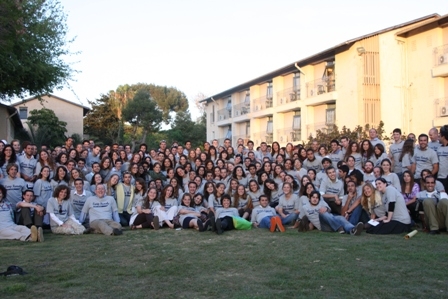46 Days Until Kayitz 2010:

Amy Skopp Cooper, Assistant Director of the National Ramah Commission wrote a really great article about her experience in Israel training the Mishlachat. Enjoy …
The Training Seminar for 2010 Ramah Mishlachat
Amy Skopp Cooper, National Assistant Director
In
recent weeks, Ramah senior leadership spent five days at the retreat center at
Kibbutz Shefayim training the 150 new shlichim who will be joining our staffs
this summer. All first-year Jewish Agency shlichim are required to
participate in this intensive training program; returning shlichim join the
group for Shabbat. The following is a brief narrative of our experience:
The
shlichim arrived early Wednesday morning, many directly from their army bases,
some still in uniform. Despite the initial excitement of being hired, very few
had a clear idea of what working at Ramah really meant. Thus, the focus of our
first day was on team building, an introduction to the North American Jewish
community, and to Ramah camps in particular. A highlight of our first day was
when the entire Ramah group came together for the first time. The directors and
assistant directors introduced themselves, showed where their camps were on a
large map of North America, and talked about the core principles of Ramah.
During the introductions, we weaved in various Ramah stories, including the
wedding and birth announcements of former shlichim who met at Ramah. After each
story, the group began to chant "You see, it happens at Ramah."
Throughout the week, whenever there was a poignant moment, we ended with that
chant. Lianne, our new Jewish Agency coordinator, was introduced to the group.
Lianne's parents met at Ramah Canada, her father having come on a mishlachat.
When Ariella Moss Peterseil (assistant director of Ramah Canada) and Michal
Chacham (assistant director of Ramah Seminar) were introduced, we noted that
both first came to Ramah through the Jewish Agency mishlachat program. Now,
several years later, they have prominent positions with Ramah. The
mishlachat applauded and cheered "You see, it happens at Ramah."
Day
2 was spent exploring issues of Conservative Judaism, Jewish identity, and
Israeli identity. The majority of this year's shlichim come from non-observant
homes. Early in the day, most were defining themselves as chiloni (secular).
However, as the discussions intensified and people were challenged, many began
talking about the role that religion does play in their lives. With no war and
no intifada, this year’s shlichim seemed more optimistic and hopeful than those
on previous training seminars. Their conversations were not as political and
were focused much more on what it means to be an Israeli and Jew in 2010.
The
highlight of the seminar was Shabbat, when close to 300 Ramahniks, including a
small group of our North American staff, joined together. The singing,
davening, and dancing during Kabbalat Shabbat were joyful and inspirational.
That spirit permeated all of Shabbat and was palpable everywhere. Staff members
from individual camps had plenty of time for bonding, discussions, study, and
program brainstorming. The dvar torah on Shabbat morning was given by Adi, a
returning shlicha from Ramah California and one of the group leaders at the
seminar. A self-defined secular Jew, this was her first dvar torah. A few
translated lines follow:
I
do not think that we are holy—we are people. However, through our actions, we
produce kedusha in the world. For me, shlichut has become kadosh and has given
my life meaning. Everything you do in camp, every interaction, every
conversation, every funny moment, every time you swim with a child, every
opportunity you have can be transformed into a moment of kedusha. Open
yourselves to the experience and it will be life changing.
Much
of Shabbat afternoon was spent talking about shlichut. Shlichim began to
consider how they will define their own personal shlichut and the role of
mishlachat at camp. Our mishlachat heads facilitated these important
conversations
We
concluded Shabbat afternoon with a storytelling session. Returning shlichim and
North Americans shared personal stories emphasizing the impact that shlichim
can have. Stories were funny, emotional, and truly captured the impact that
shlichim can have at camp and the impact that Ramah can have on shlichim. A
stunning group havdallah brought our Shabbat together to a close.
Shlichim
finished the seminar on Sunday exhausted, excited, empowered and ready; like
us, they now begin to count days until our camp seasons begin.